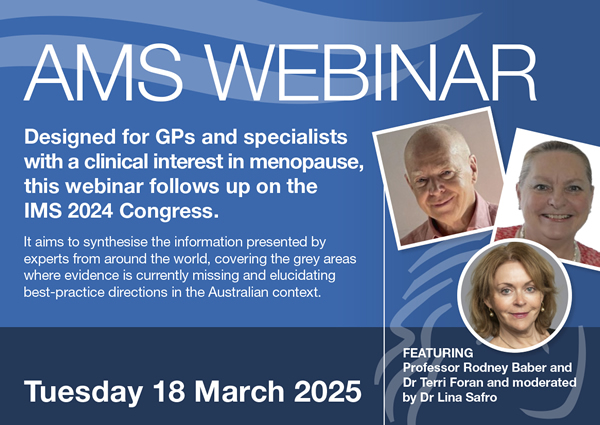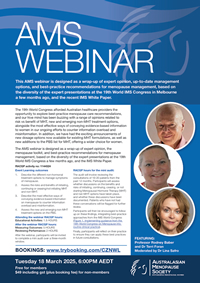
Following the 19th IMS World Congress on Menopause in Melbourne in October, the topic of menopause has remained firmly in the spotlight. As the number of evidence-based guidelines has grown, so has consumer health literacy and a wide range of clinical practices promoted by various stakeholders in the menopause space.
The 19th World Congress afforded Australian healthcare providers the opportunity to explore best-practice menopause care recommendations, and our hive mind has been buzzing with a range of opinions related to risk vs benefit of MHT, new and emerging non-MHT treatment options, alongside the most effective ways of conveying evidence-based information to women in our ongoing efforts to counter information overload and misinformation. In addition, we have had the exciting announcements of new dosage options now available for existing MHT formulations, as well as new additions to the PBS list for MHT, offering a wider choice for women.
The AMS webinar is designed as a wrap-up of expert opinion, the menopause toolkit, and best-practice recommendations for menopause management, based on the diversity of the expert presentations at the 19th World IMS Congress a few months ago, and the IMS White Paper.
Date and Time
18 March 2025 6.00-7.30pm AEDT
Speakers
Professor Rodney Baber AM
Dr Terri Foran
Dr Elina Safro - Moderator
RACGP points available
See details online here

Download webinar flyer:  AMS Webinar 18 March 2025236.03 KB
AMS Webinar 18 March 2025236.03 KB
Exclusive Interview with Dr Therese Foran and Professor Rodney Barber: Regarding the forthcoming webinar Designed for GPs and specialists with a clinical interest in menopause, this webinar follows up on the IMS 2024 Congress.
Dr Therese Foran and Professor Rodney Barber share their thoughts on next week’s webinar and reflect on important takeaways from the 2024 IMS Congress.
Read on for their valuable insights.
1. Regarding the 2024 IMS Congress, what information is worth sharing with your medical colleagues?
Dr Therese Foran:
The key take-away messages from the conference are that there are still many areas of menopause management where even the experts disagree on the best course of action! This realization makes me feel somewhat better when I am grappling with tricky patient decisions, it brings some frustration knowing that sometimes the evidence lags behind practice. That being said, there were many outstanding presentations.
Two that particularly stood out for me were Prof Jason Abbott’s skilful and humorous dissection of the effectiveness of vaginal laser therapies for genitourinary syndrome of menopause, and Nanette Santoro’s presentation on the importance of perimenopause as a predictor of subsequent cardiovascular disease risk. These left a lasting impact and are worth considering in our practice.
Professor Rodney Barber:
For me, the key findings were:
- How complicated the perimenopause can be. Nanette Santoro’s plenary was absolutely fantastic in highlighting this.
- Mood changes and anxiety—this was covered in both a debate and an excellent symposium. While the messages are not straightforward, the key takeaway is that ‘brain fog’ is common, particularly during perimenopause. Many women respond to MHT, and it usually subsides once perimenopause ends. It’s important to note that most women don’t become depressed during menopause, but if they have other triggers or a history of depression, they’re more likely to. All women who complain of depression should be thoroughly assessed, and MHT can be a treatment option for perimenopausal mood changes, especially if this is a first presentation.
- The ongoing discussions about treatments—particularly the appropriate use of MHT, testosterone, and the new range of non-hormonal treatments—are definitely worth reviewing.
2. Please name three key pieces of information that will be highlighted at the forthcoming webinar.
Dr Therese Foran:
- How our patients are getting their information on perimenopause and menopause symptoms and management.
- Is more, better when it comes to Menopausal Hormone Therapy (MHT)?"
- When there are differences in guidelines and recommendations, how does the humble clinician decide what to do?
Professor Rodney Barber:
We will certainly discuss the use of non-hormonal medications, the appropriate use of MHT and testosterone, and, if time permits, we’ll also cover treatment of depression and cardiovascular disease. It will be an essential and insightful discussion on these topics.
3. What key takeaways are you hoping people take from the forthcoming webinar?
Dr Therese Foran:
- That we still do not have all the answers when it comes to menopause management.
- Menopause influencers, both medical and non-medical, are having an increasing impact on the information being disseminated to women looking for answers and advice.
- Testosterone: What is the evidence, and where does it currently fit in menopause therapy?
Professor Rodney Barber:
- A better understanding of how to treat menopause symptoms.
- Greater confidence in using MHT and non-hormonal treatments.
- A better understanding of perimenopause and how to manage it effectively.
4. Is there anything else you’d like to add about this webinar?
Dr Therese Foran:
I hope you will join us for what promises to be a wide-ranging and practical discussion of the dilemmas we all face in delivering a high standard of care to our perimenopausal and menopausal patients.
Professor Rodney Barber:
Thank you for the opportunity to be part of this webinar, I look forward to engaging in these important discussions with everyone.
Join Dr Therese Foran and Professor Rodney Barber for an engaging and informative at next weeks’ webinar that explores the evidence-based guidelines stemming from the IMS 2024 Congress. We look forward to seeing you there!
Registration
AMS members only: Free (add promotion code available in February eChanges)
Non-AMS members: $49 (GST INC, plus booking fee)
Register here: https://www.trybooking.com/CZNWL
Speaker Bios: are online here